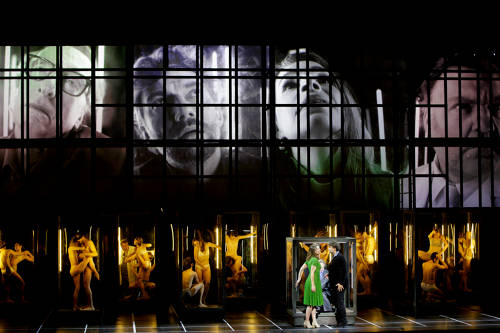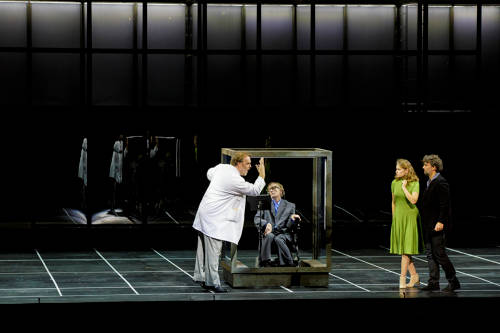By: Frank Cadenhead
There was a torrent of boos at the December 11 opening of Berlioz’ La Damnation de Faust at the Paris Opéra and it started even before the intermission. Critical reaction to the production was of a similar nature. When I saw the production on December 29, there was only a single person booing and the general applause was clearly enthusiastic. For me, the evening was a major success with extraordinary musical values and a probing, thoughtful production that went to the core of the Faust legend. Is there a problem with opera as an intelligent media? Has the presentation of opera slid into a rut, expecting everyone in the audience to re-experience a familiar story. In the past few decades, some directors challenged that premise and had to endure the wrath of both the audience and critics. Should world opera’s directors play to the crowd or seek a higher artistic level of thought. I imagine that Stéphane Lissner, in his new role heading the Opéra National de Paris, is trying to move the bar up. Berlioz’ “légende dramatique“ is a retelling of Goethe’s Faust and opera can be as intellectually challenging at a classic novel or a new work of art
When I was a young man, one visit to Sea World in San Diego stayed with me. In the huge tank, two Killer Whales were having sex, something extraordinary to witness. They both turned in vast circles, finally bumping fronts for just a second or two. The male’s member was humanoid in size and barely noticeable. Sometimes they connected, and often didn’t, but they continued their slow dance over and over. This experience left me with two thoughts. One was the realization that arms are an important tool for love-making. The other was a reminder that the compulsion of sex and reproduction is central to understanding human behavior.
You can see this long, circular dance repeated over and over in literature, theater, art, film, poetry and opera. Yes, opera. Those chance meetings, those jealous rages, falling in love, etc., are all part, like our mammalian friends, the whales, of the great circle of compulsive sexual desire and reproduction, the very means to allow the human race to escape extinction. Those who compose poems, carve statues or make rockets which go to Mars are still, at the core, animals in the circular sexual dance. This desire is always, in conversation, dressed up and usually covered with the sauce of denial.
The sauce of denial was in full view on opening night. Alvis Hermanis’ production makes clear his scripted intent at the very start. We see, before the music starts, a large group assembled and 20 are selected to stand in little cubicles. We see names, ages, and a sentence about their life. These represent some actually chosen by NASA in February of last year from some 200,000 applicants. NASA selected 100 candidates to be transported to Mars in 2016 to establish a colony of humans on the Red Planet. With no “return ticket,” this will be a colony intended build homes, to grow and reproduce in the hostile environment. (Whether or not any budget will actually fully fund this project is another story but the planning is precise and clear.)
These 20 dancers, almost immediately after their introduction, begin their coupling with sexual interactive ballet movements that continue throughout the opera with an ironic stricture which allows nothing sensual or erotic. The intertwining is clearly meant to be biology at work and, at one point, in case anyone misses the idea, a glass box is on stage with Adam and Eve represented. What does this have to do with the Faust legend? Bryn Terfel’s masterful Méphistophélès, hip flask at the ready, is always one to remind Faust of his interior libido and takes him around the world an into space. The lovely film images of Katrīna Neiburga with those jellyfish and, yes, even whales, continually evoke the continuity of life.
The image of scientist Stephen Hawking is every present. Now motorized chair-bound and without even a voice, has not let his impairments affect his thinking. His constant effort to search the outer and inner limits of our tiny world makes him the world’s best known scientist. His mute character in this production, almost always on stage, is not by accident. He has said specifically that, in the next thousand years or so, the earth might be hit by a comet or experience some other catastrophe which could destroy all life. Another colony on another planet might continue the existence of the human race which is, so far as any of us know, the only advanced one in the universe. He repeated this urgent request, as was reported in newspapers, just two weeks ago. Hawking as the new century’s Faust is not a far reach.
The production is available on Culturebox and can be easily found on YouTube and is strongly recommended.Tenor Jonas Kaufmann as an existential Faust heads a dream cast with the Marguerite of Sophie Koch and the blazing Bryn Terfel as the devil incarnate. The remarkable and haunting production of Schoenberg’s Moses and Aaron which was the first new production of this season is also to be found on YouTube. With the engaging new production of Dukas’ Bluebeard’s Castle paired with Poulenc’s La voix humaine, with the astounding soprano, Barbara Hannigan, Lissner, in his second season as the Opéra director but presenting the first season he actually designed, has indeed moved the bar and is demanding a rethink of what opera finally represents. It is an interesting time for opera in Paris.

